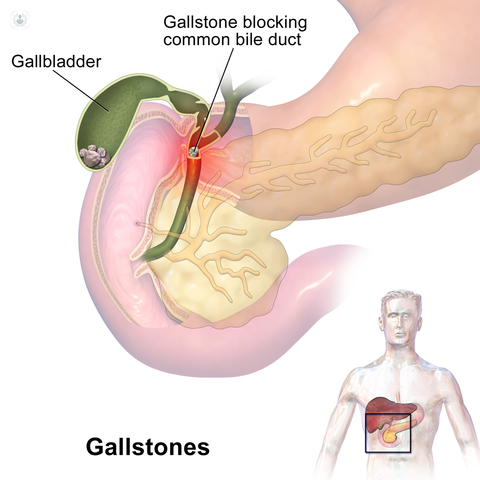

What is cholelithiasis?
Cholelithiasis refers to the presence of one or more gallstones in the gallbladder. Gallstones are little stones made of cholesterol formed in the gallbladder. The gallbladder is a small organ found underneath the liver and aids digestion by releasing a digestive fluid called bile into the small intestine.

What are the symptoms of cholelithiasis?
Most of time gallstones do not cause any symptoms and do not require treatment, however, if a gallstone happens to get trapped in a duct inside the gallbladder, it can cause the following symptoms:
- Intense and constant abdominal pain (called biliary colic)
- Pain between your shoulders
- Nausea and/or vomiting
Sometimes cholelithiasis can be more serious, especially if the gallstone blocks the flow of bile, and the following symptoms can be triggered:
- Fever
- More intense pain
- Diarrhoea
- Jaundice
- No appetite
What causes cholelithiasis?
Although causes of gallstones are not totally clear, they are thought to occur when there is an imbalance in the make-up of the bile inside the gallbladder. Such imbalances are thought to occur when:
- High levels of cholesterol are found in the gallbladder, meaning there is not enough bile to digest the amount of cholesterol in the gallbladder. The excess cholesterol then forms into gallstones.
- High levels of bilirubin are found in the gallbladder. Bilirubin is a waste product made when red blood cells are broken down. Excess bilirubin contribute to the formation of gallstones.
How can cholelithiasis be prevented?
Research indicates that weight-loss and diet can help to prevent gallstones developing.
A healthy, low-saturated fat diet is recommended. This is helps to reduce the intake of bad cholesterol which can cause gallstones to form. Also recommended, is avoiding the consumption of large amounts of alcohol.
Being overweight is also a risk-factor for developing gallstones. Therefore, maintaining a healthy weight by eating healthily and exercising regularly is highly recommended. Losing weight via low-calorie diets are not recommended however, as they have been linked to disrupting bile production, and can therefore increase chances of gallstones developing.
What is the treatment for cholelithiasis?
If your gallstones do not cause symptoms, then most likely you will not need treatment, but will be recommended to actively monitor your condition, and to return to a specialist if symptoms occur. However, those who do experience symptoms will likely have the following treatment options:
- Gallbladder removal surgery (cholecystectomy) – gallstones can reoccur, so removing the gallbladder entirely is one way to ensure that gallstones do not recur. After it is removed, bile goes straight from the liver in to the small intestine.
- Medications – there are certain medications designed to dissolve gallstones and are taken orally. These need to be taken over a long period of time and are not always effective.
